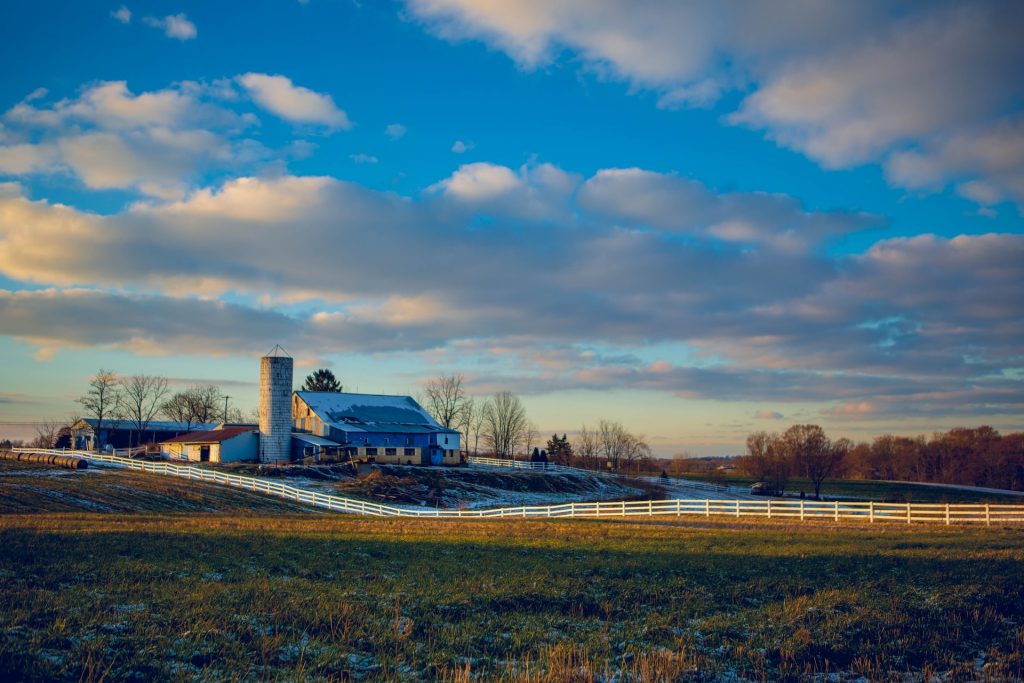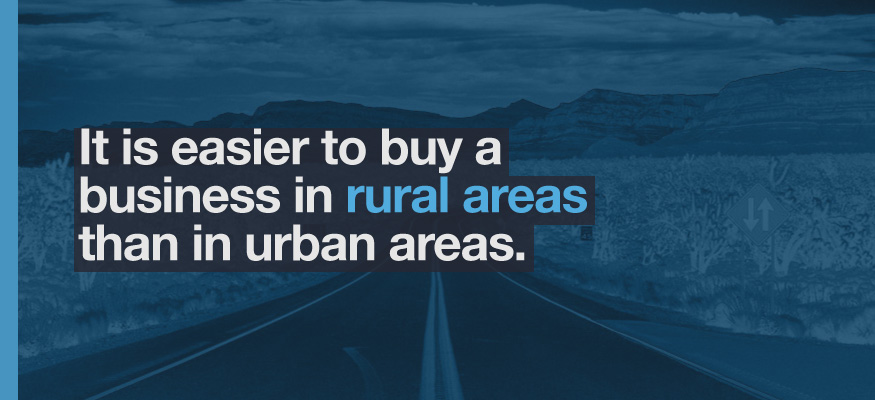For most entrepreneurs—new or experienced—it’s almost a no-brainer to establish or acquire a business in the city. Business is better in urban areas, right?
But have you seriously considered buying a business in a rural area?
Urban areas are full of customers, resources, networking opportunities, and infrastructure. But at the same time, urban businesses experience intense competition, high staff turnover due to unlimited options, low-profit margins, and more risk of failure.
Rural businesses, on the other hand, have a certain appeal that isn’t frequently considered. You should consider them because you never know where a desert has placed an oasis for you.
Don’t subscribe to the idea that rural businesses are inferior to urban businesses. According to ERS Research, rural manufacturers were equivalent to their urban counterparts in adopting new technologies and innovation.
The industries might not be large-scale in rural counties, but you can have cheaper resources, better financing, and less competition. And it is a great way to support local entrepreneurship.
Many entrepreneurs have found success in rural areas. Think about Wal-Mart starting in a small town in Arkansas. You can do the same. We’ll show you the pros and cons of buying a business in a rural area so you can decide whether to capitalize on the opportunity.
What’s it Like to Own a Business in a Rural Area?

Consider this story of Rovena Claxton published on Next Avenue:
She was an HR professional and served for almost 30 years in mostly corporate giants and large companies. Before her retirement, she and her husband decided to move to the house they’d built in Grand Marais, Minn. The population of this small town was only 1300.
One day Rovena visited a coffee shop where other small-business women entrepreneurs were gathered. The women recognized Rovena’s talent for solving workplace challenges and said they would hire her to help them.
This is when the entrepreneurial career started. She launched her own HR consultation and called it North Shore Human Resource Consulting.
This began a new journey for her. She has been a one-person army managing her social media, website, webinars, and a lot of things to grow her business. The growth of rural businesses might be slow, but success is very possible and usually smoother.
Pros of Buying a Rural Business
There are some great opportunities in buying a rural business that entrepreneurs should leverage. Some benefits of owning a rural business are:
Less Competition
According to the Global Entrepreneurship Monitor report, 14% of the American population is running or planning to start their own business. That is about 27 million entrepreneurs in the country.
What this means is if you’re interested in owning a business in the metropolitan area, there would be millions of others too.
Would it be easy to survive in such a competition?

About 90% of startups fail in the USA, with 10% of startups failing within the first year of operations. Even 19% of startups were forced to shut down by competitors or taken over, according to a CB Insight study.
Stiff competition and uncertainties are rife in urban areas. Whereas, if you move toward rural areas, you might not have to face any competition in your business niche. Also, you’ll experience more authority and an abundance of resources.
However, whenever you’re buying a business in a rural area, research the community choices. After all, your biggest pass to survival in rural businesses is aligning your business niche with products and services in local demand.
Lower Overhead Expenses
Overhead costs play a controlling role in running your business’s day-to-day operations.
The overhead expenses like insurance, rent, utilities, and maintenance take up a large part of the costs incurred by urban businesses. On the other hand, overhead costs are considerably lower in rural areas, which can prominently contribute to increasing the profitability of your business.
Easier to Secure Financing
In big cities, financing opportunities are enormous, but getting access to them is difficult. There are a lot of formalities and corporate procedures to be followed. Most financial institutions are national banks that require you to fulfill a lot of requirements and security.
Whereas, if you move toward rural areas, the most prominent financial players are local credit unions, independent banks, and investors. Most of these institutions focus on investing in the local community. Therefore, it will be easy to get a line of credit or financing required to grow your business there.
Besides, there are many government grants that your business might qualify for if working in rural areas.
Easier to Buy a Business in Rural Areas
With all the benefits mentioned above, it is easier to buy a business in rural areas than in urban areas. With lower competition, low overhead costs, easy access to financial resources, and lower cost of living, it is easier to purchase a business in a non-metropolitan area.

When buying a business in a rural area, the bargaining power of the buyer dominates that of the seller. Therefore, you can get a better price for a business in rural areas for several economic and social factors than in urban areas.
More Low Hanging Fruits
Since you might be the only one running a particular business in the locality, you have easy access to raw materials, labor, and customers. All these factors improve the profit margins of your business. According to Score Org, rural businesses have a higher average profit margin of 56% compared to the 53% of their urban counterparts.
Cons of Buying a Rural Business
Of course, there are some downsides to buying a rural business too. Here are some cons you must analyze before buying a rural business:
Slower Growth
Despite better profit margins, no rigorous competition, and at-hand access to resources, rural enterprises tend to grow slower. Low annual revenues can characterize this sluggish growth. The slow growth is caused by the small customer base and the low cost of living in rural areas.
Many urban businesses witness fast growth due to unique selling points, customer services, and customer-driven products. However, in rural businesses, the annual revenues are lower than those of urban businesses. But, if the percentages of profit margins are compared, rural businesses out-stand urban ones.
Smaller Economy
If you want to thrive in a healthy and enriched business ecosystem, the smaller economy and business ecosystem in rural areas might turn off your enthusiasm. Due to a lack of economic opportunity, lower education level, under-developed infrastructure, you might be putting a barrier to your business’s future expansion.
Harder to Find Labor
The sometimes lower education level of individuals, less skilled labor, and smaller prime-age labor force can negatively affect your business operations. According to ERS Research, the prime-age labor force participation is lower in rural areas due to more population lying in older age brackets.
Although the education level has improved in rural areas, there is still a long way to go when the rural labor force competes with the urban labor force.
Transport Infrastructure may be Inadequate
You might have to face another challenge of under-developed transportation infrastructure in rural areas. Hence, it will impact your business operations if you depend on transportation.
In a Nutshell…
Running a business in a rural area has its own benefits, like less competition, easily accessible financial resources, better profitability, and lower costs. There are some cons to operating a business in rural areas. However, these cons don’t overshadow the pros of buying a rural area business.
When buying a business, you must closely analyze all the unique factors of the business and its requirements. It might be possible that the specific business might work better in rural areas than in urban cities. If you’re looking to buy a business, reach out to our team to start your journey!
Acquira specializes in seamless business succession and acquisition. We guide entrepreneurs in acquiring businesses and investing in their growth and success. Our focus is on creating a lasting, positive impact for owners, employees, and the community through each transition.



